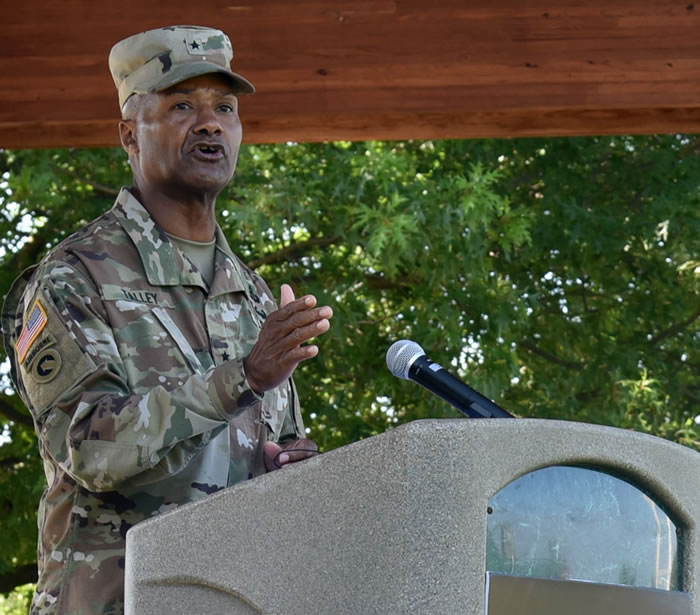USAMRDC Passes Torch in Moving Change of Command Ceremony

On July 24, 2019 the U.S. Army Medical Research and Development Command hosted a Change of Command ceremony at Fort Detrick, Maryland as Maj. Gen. Barbara R. Holcomb relinquished command to Brig. Gen. Michael J. Talley during an event officiated by Gen. John M. Murray, Commanding General of the U.S. Army Futures Command.
Speaking at the beginning of the ceremony, Murray made clear his affection for the USAMRDC and, further, his understanding of the importance of the overall mission of military medicine.
"The MRDC has an amazing history," said Murray. "While most Americans will never truly understand and appreciate what you've done and what you continue to do, the impact of this command, today and throughout history, has been felt worldwide."
Murray added words of support for both Holcomb and Talley, as both now steer into different parts of their respective lives: Holcomb moving into retirement and Talley stepping to the forefront of the military's lead medical research and development organization.
"To keep up with both the pace of change and the great reputation of this command requires determined and exceptional leadership, and this is exactly what Maj. Gen. Holcomb has provided," said Murray. "Barb and her team, in no small part, have changed the world."
Holcomb was next to step up to the podium, and her opening comments regarding her dedication to the USAMRDC were met with applause.
Reflecting on her three-year assignment, she said, "The MRMC, now MRDC, really has been the best job that I've had in my career - it's the best job in the Army. It's been professionally challenging, and professionally rewarding."
Notable advancements under the USAMRDC banner during Holcomb's tenure include U.S. Food and Drug Administration approval of the anti-malarial drug Tafenoquine and emergency-use authorization for the application of freeze-dried plasma on the battlefield. In addition, the USAMRDC made substantial strides in the areas of unmanned and vertical lift technology during that time; with both areas being integral to the application of the type of cutting-edge medical technology likely required for success in next-generation combat zones. Regardless, Holcomb, who served as Commanding General of both USAMRDC and Fort Detrick as well as Chief of the U.S. Army Nurse Corps over the past three years, offered welcome advice to Talley.
"Strap in, and enjoy the ride," she said. "It's turbulent at times, so let the staff be your ground control. They are the experts and professionals - they are passionate about the mission of saving lives and serving our nation."
Talley steps into the USAMRDC leadership role from his most recent assignment at Fort Belvoir, Virginia, as Deputy Commanding General for the Regional Health Command–Atlantic. A veteran of Operation Iraqi Freedom, Talley has notably led Soldiers, Sailors, Airmen, Marines, and civilian personnel across a military career that stretches back to 1983 and includes a slew of high-profile operational and logistical postings.
"It's a great day to be a Soldier-scientist at the center of the medical research and development universe," said Talley. "General Murray, thank you for your kind words, and thank you for having the confidence and trust in me to lead the men and women of this great organization during this exciting and challenging time in our history."
In his remarks to the crowd, Talley struck a tone of genuine, unbridled excitement, and spoke at length about his desire to tackle the looming obstacles facing the future of military medicine.
"I look forward to the tremendous challenges in front of us, as the Army undergoes its largest reorganization since 1973." Talley continued, "The MRDC will remain committed to rapidly and responsibly developing, delivering and sustaining medical capabilities for the Warfighter, so that we remain the most powerful military in the world."
Talley concluded his remarks by thanking the many people who have helped him reach this point in his career, specifically noting his parents.
"My mother, Joan, and my late father, Retired U.S. Air Force Chief Master Sergeant Louie Talley, are not here today, but I wish to thank them publically for affording me and my brother and sisters a life of privilege - not in a monetary sense, but as it pertains to values, discipline and hard work ethic," he said. "Thanks to them, the Army Values were easy to adopt, because those values are what they instilled in us all of our lives."
 An official website of the United States government
An official website of the United States government
 ) or https:// means you've safely connected to the .mil website. Share sensitive information only on official, secure websites.
) or https:// means you've safely connected to the .mil website. Share sensitive information only on official, secure websites.


